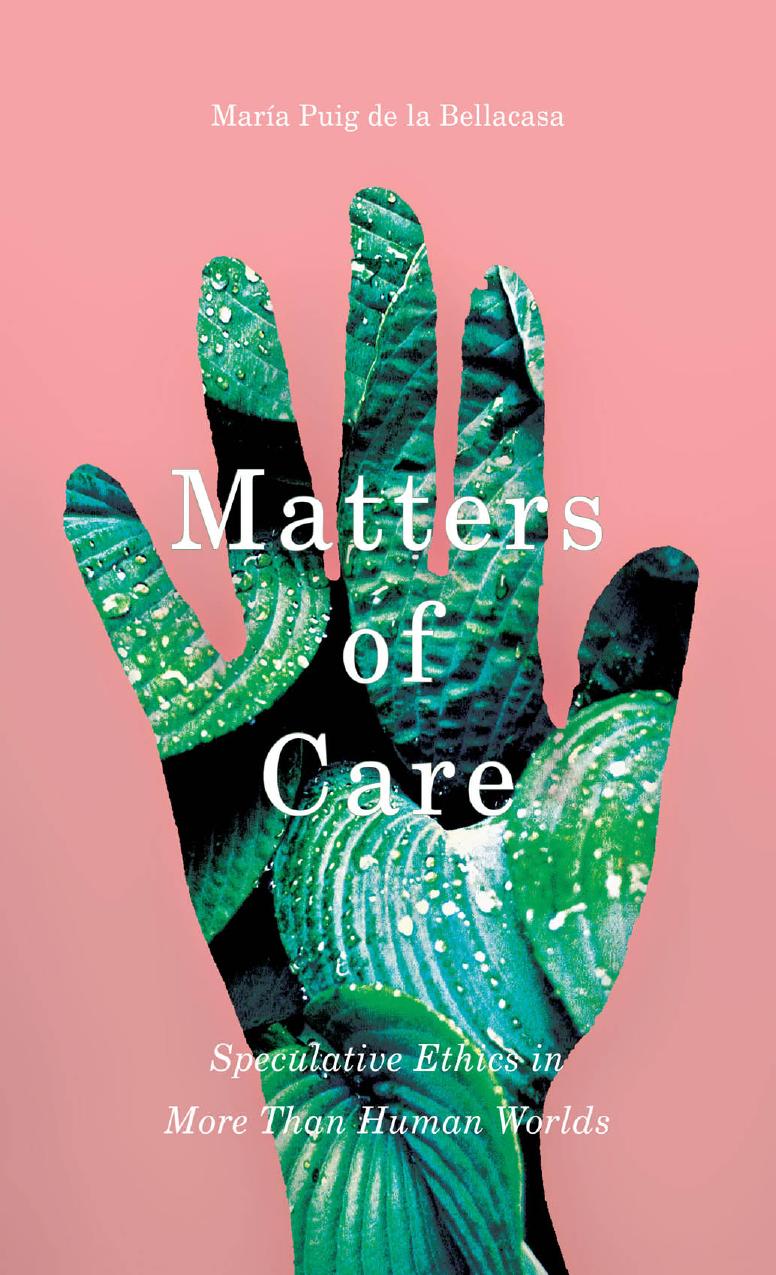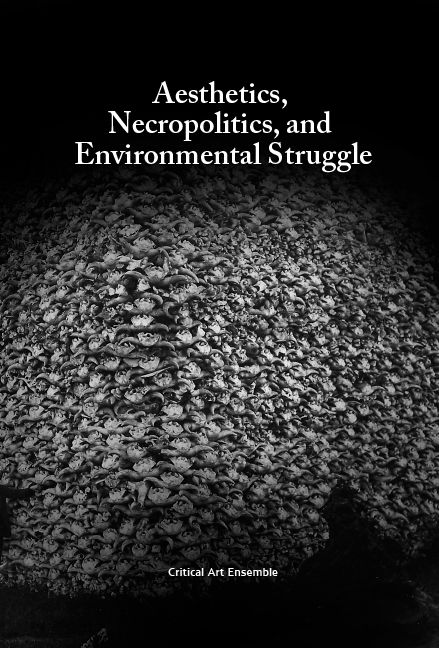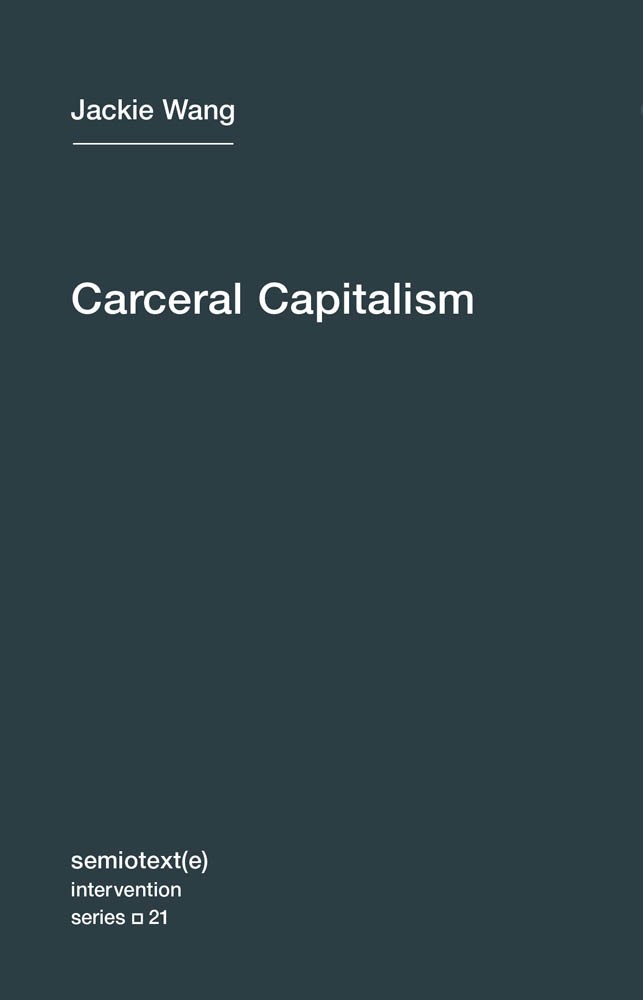María Puig de la Bellacasa: Matters of Care: Speculative Ethics in More than Human Worlds (2017)
Filed under book | Tags: · agency, biopolitics, care, ecology, ethics, feminism, knowledge, naturecultures, object, politics, soil, technoscience, touch

“To care can feel good, or it can feel bad. It can do good, it can oppress. But what is care? A moral obligation? A burden? A joy? Is it only human? In Matters of Care, María Puig de la Bellacasa presents a powerful challenge to conventional notions of care, exploring its significance as an ethical and political obligation for thinking in the more than human worlds of technoscience and naturecultures.
Matters of Care contests the view that care is something only humans do, and argues for extending to non-humans the consideration of agencies and communities that make the living web of care by considering how care circulates in the natural world. The first of the book’s two parts, “Knowledge Politics,” defines the motivations for expanding the ethico-political meanings of care, focusing on discussions in science and technology that engage with sociotechnical assemblages and objects as lively, politically charged “things.” The second part, “Speculative Ethics in Antiecological Times,” considers everyday ecologies of sustaining and perpetuating life for their potential to transform our entrenched relations to natural worlds as “resources.”
From the ethics and politics of care to experiential research on care to feminist science and technology studies, Matters of Care is a singular contribution to an emerging interdisciplinary debate that expands agency beyond the human to ask how our understandings of care must shift if we broaden the world.”
Publisher University of Minnesota Press, Minneapolis, 2017
Posthumanities series, 41
ISBN 9781517900656, 1517900654
265 pages
Reviews: Miriam Ticktin & Katinka Wijsman (Hypatia, 2017), Sonja Jerak-Zuiderent (Science & Technology Studies, 2017), James McMaster (Women & Performance, 2017), Kelly Dombroski (Journal of Cultural Economy, 2018), Stephen Healy (Journal of Cultural Economy, 2018), Elizabeth Reddy (Journal of Cultural Economy, 2018), Gerda Roelvink (Journal of Cultural Economy, 2018), Maria Puig de la Bellacasa (response, Journal of Cultural Economy, 2018), Katie Ulrich (Cultures of Energy, 2018), Garrett Bunyak (Configurations, 2018), Sarah Weiger (ISLE, 2019), Farhan Samanani (Society+Space, 2019), Richard Brons (Ethics of Care, 2019).
Commentary: Michelle Murphy (Social Studies of Science, 2015).
Interview with author (Cultures of Energy, 2018, 70 min)
Comment (0)Critical Art Ensemble: Aesthetics, Necropolitics, and Environmental Struggle (2018)
Filed under book | Tags: · aesthetics, anthropocene, biopolitics, climate crisis, environment, necropolitics, politics

“With typical sangfroid, CAE dissects the beast of our own making: the Anthropocene. Clarifying the philosophical roots of the Euro-American confusion about nature, this text offers severe and essential medicine for coming to terms with our ecological predicament.” –Claire Pentecost, professor, School of the Art Institute of Chicago
“This book presents a perspective about the environmental crisis that I suspected was there but couldn’t put my finger on. Follow these authors deep into one of the biggest cultural lacunas of our day: necropolitics. This book fully abandons solutionist bull in favor of a measured approach grounded only in what we know. Read it, weep, and then kick ass. Once again, CAE has blown my fucking mind.” –Mike Bonanno, The Yes Men
Publisher Autonomedia, Brooklyn, NY, 2018
Anti-copyright
ISBN 1570273375, 9781570273377
167 pages
PDF (pages 120-127 missing)
PDFs
Jackie Wang: Carceral Capitalism (2018)
Filed under book | Tags: · algorithm, biopolitics, capitalism, governance, incarceration, race

“In this collection of essays, Jackie Wang examines the contemporary incarceration techniques that have emerged since the 1990s. The essays illustrate various aspects of the carceral continuum, including the biopolitics of juvenile delinquency, predatory policing, the political economy of fees and fines, cybernetic governance, and algorithmic policing. Included in this volume is Wang’s influential critique of liberal anti-racist politics, ‘Against Innocence,’ as well as essays on RoboCop, techno-policing, and the aesthetic problem of making invisible forms of power legible.
Wang shows that the new racial capitalism begins with parasitic governance and predatory lending that extends credit only to dispossess later. Predatory lending has a decidedly spatial character and exists in many forms, including subprime mortgage loans, student loans for sham for-profit colleges, car loans, rent-to-own scams, payday loans, and bail bond loans. Parasitic governance, Wang argues, operates through five primary techniques: financial states of exception, automation, extraction and looting, confinement, and gratuitous violence. While these techniques of governance often involve physical confinement and the state-sanctioned execution of black Americans, new carceral modes have blurred the distinction between the inside and outside of prison. As technologies of control are perfected, carcerality tends to bleed into society.”
Publisher Semiotext(e), South Pasadena, CA, 2018
Intervention series, 21
ISBN 9781635900026, 1635900026
359 pages
Interview with author (M. Buna, LA Review of Books, 2018)
Review: Steven Zultanski (Frieze, 2018).

